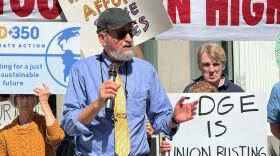Decades before monkeypox, another outbreak was predominantly affecting gay men: HIV, the virus that causes AIDS. Reporter Hank Plante was at ground zero for the epidemic: San Francisco.
"It sounds strange, but it's kind of a gift for me to be an openly gay man and a reporter working in San Francisco, and so I was able to tell the story from my own perspective and seeing that it was affecting my friends," Plante said. "It was always more than a story to me, and I wanted to get it right."
And getting it right was not easy — especially when many, including government officials, didn’t think it was an important issue.
"The subject came up at a press conference at the White House when Reagan was president, and, in the press room, the press secretary was asked about this new disease, AIDS. And the room laughed," Plante said.
A clip of this was unearthed in the White House press archives by filmmaker Scott Calonico, who added it to his short film "When AIDS Was Funny," about the indifference the administration showed toward the epidemic.
At the time, Plante said there was little to no information about AIDS. So his station, KPIX, now known as CBS News Bay Area, made a real commitment to cover it.
"So we were going on the air every night telling people how to not get the disease, what was new with treatment, were any of the drugs working. And, remember, this was at a time when the Reagan administration was barely talking about it," Plante said.
Still, he said, the lack of information led to fear and abuse of gay communities who were living in fear themselves. "People were being kicked out of their apartments," Plante said. "People were being fired. There were no legal protections back then. So it was really awful. It was terrible."
Thousands of Americans had died of AIDS by the time President Ronald Reagan said the word "AIDS" for the first time in 1985, Plante said.
Though there have been no deaths so far in the U.S. from monkeypox, Plante said, "there are a lot of parallels to the beginning of AIDS — there was inaction by the government back then."
Plante said the current monkeypox emergency was giving him flashbacks to those early days when he covered AIDS. "There were a lot of gay men who were being scapegoated and blamed for AIDS back then, and you can bet that there are men, gay people, being blamed today for this," he said. "There’s a lot of fear in the gay community that that’s going to get worse."
He urged health and government officials to get out front and, once and for all, explain exactly how monkeypox is transmitted, and do everything they can to get vaccines to people to stop monkeypox from spreading.
"There's a lot of contradictory information about it," he said. "We're going to have a lot more cases. It is preventable. Where's the vaccine? Where can people get the vaccine? Get the word out. Be transparent. Do your job."
Plante earned every award imaginable for his AIDS coverage, including a Peabody, but his goal back then was to save lives. He also believes that reporters have an opportunity to make a positive impact, but they have to get past fear. "I think there is some fear, particularly among straight journalists, that they don’t want to offend the gay community by saying it you’re getting it from gay sex," he said. "It’s not a sexually transmitted disease, but it’s the close contact [that spreads the virus]. And I think that journalists have to tell the truth about it and not worry about the backlash."
Plante said he learned a lot from covering AIDS — a lot about himself. "Once you slay your dragons in life, it makes you stronger," he said. "And so that was my big fear when I was growing up, like a lot of gay kids, and once I came out I just started to relax and enjoy life."







